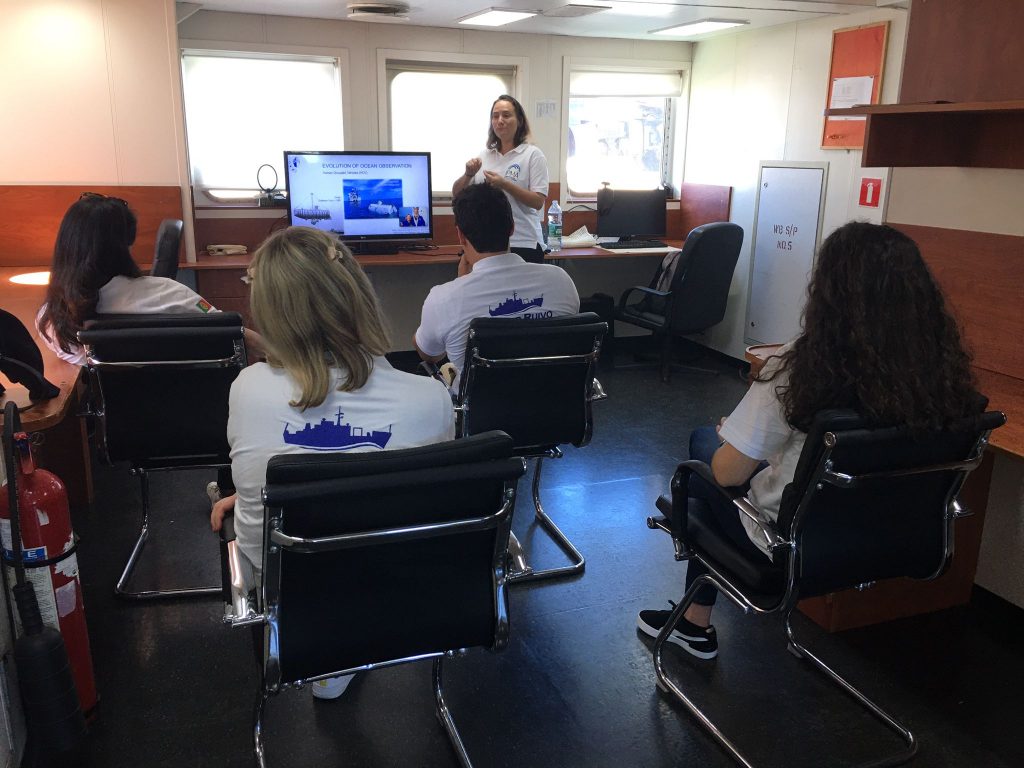EUROFLEETS+ Floating University – “Meeting societal needs for impartial evidence on the state and sustainable use of the ocean biological resources: the case of the Nephrops norvegicus (Norway lobster) ”
Onboard the R/V Mário Ruivo
Off Portugal coast (Southwest and South) 8thJune – 3rd July2022
The EurofleetsPlus “Floating University”
Eurofleets+ is a unique consortium of research vessels, equipment and scientists supported by 42 marine institutes, universities, foundations and SMEs from 24 countries around the North Atlantic Ocean and Mediterranean Sea. A key objective of Eurofleets+ is the delivery of five Floating Universities for early stage researchers of marine related sciences. Floating Universities will address a range of themes and topics and focus on the applications and operation of research vessel data acquisition and sampling systems and equipment.
General course objectives
The general objective of the course was to provide theoretical background and practical experience in the scientific understanding of marine ecosystems and the services they provide, and to use this knowledge to generate state-of-the-art advice for meeting conservation, management, and sustainability goals using as a case study the Nephrops norvegicus (Norway lobster).
 |
 |
| R/V Mário Ruivo | Target-area |
Students were familiarized with measurements and sampling protocols. Training will be conducted during the Crustaceans survey taking place along the Southwest and South coasts of Portugal, on board of R/V Mário Ruivo which is operated by Portuguese Institute for Sea and Atmosphere, Lisboa, Portugal.
 |
| Working day at R/V Mário Ruivo |
Learning objectives
The course was addressed to post-graduates student conducting education and research for development of Master of Science and Ph.D. degree.
Students participating in this course learned to:
- estimate the relative abundance of Nephrops norvegicus (Norway lobster) and deep-water rose shrimp for use in the assessment and advice process
- study the geographical distribution of the target-species
- determine biological parameters (sex-ratio, length-weight, maturity, growth) meeting the Data Collection Framework sampling requirements
- monitor the distribution and relative abundance of accompanying fish and invertebrate species
- collect data for the determination of biological parameters for selected fish species
- collect data for biodiversity studies and information on marine litter distribution to comply with the EU Marine Strategy Framework Directive requirements
- collect hydrographical and environmental parameters (e.g., temperature, salinity)
- collect sediment data to improve the definition of target-species habitat
Course content
The course was composed of a combination of lectures, practical sampling/measurements, laboratory work (on board), and interpretation of data. A description of planned experimental work, survey design & planning, and practical issues was carried on board after the begging of the survey. On board students worked in two groups conducting all the different measurements taken during the survey. Data acquisition and processing workshops were conducted in the evenings together with lectures presenting the scientific aspects of the study area. Analysis and interpretation of the instrumental measurements data collected during the cruise took place on board. The course ended in Lisbon (Portugal), with a presentation/open discussion on the data collected, and the compilation of the cruise report by students on the last day on-board.

